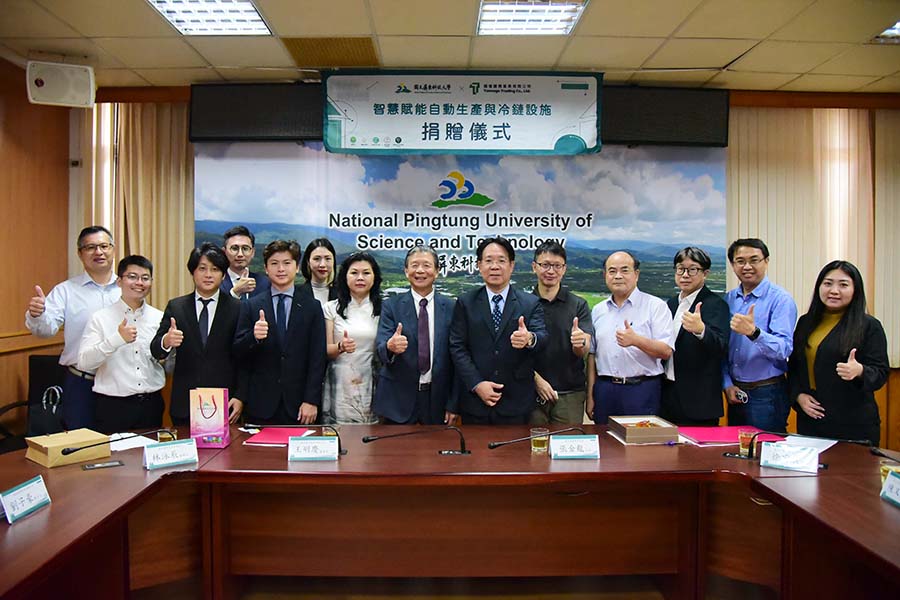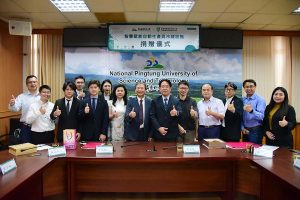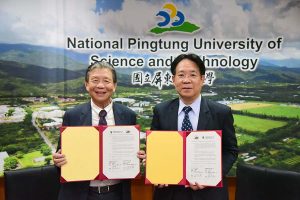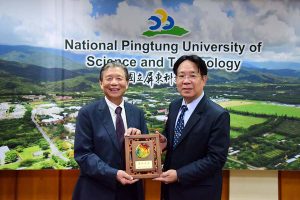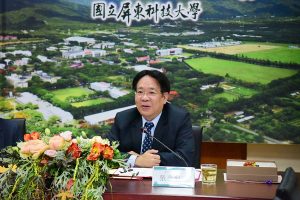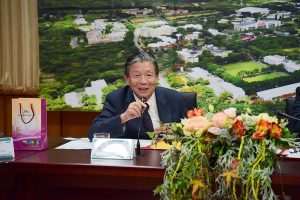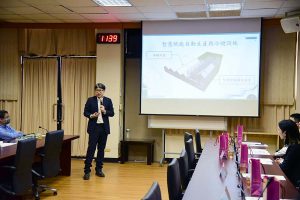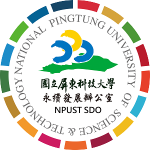Tropical agriculture research and talent cultivation are important features of development at NPUST. And in order to meet today’s technological and societal needs, the College of Agriculture is strategizing to cultivate more high-level technical agriculture talent. As part of this effort, on April 19th, NPUST and Tongyi International Trading Co., Ltd. signed a Memorandum of Cooperation centered on the donation of “Smart-Empowered Automatic Production and Cold Chain Facility”. The memorandum was signed by NPUST president, Chin-Lung Chang, and E&R Engineering Corp. chairman, Ching-Ming Wang. A number of top level representatives from the university, Tonnage Trading Company, and Mirle Automation Corporation were in attendance to witness the event. Through the agreement, funds from the technology industry will be used to develop industry-university cooperation and cultivate agricultural technology professionals and cross-domain talent.
NPUST President Chin-Lung Chang said, “the advanced environment-controlled greenhouse will be able to enhance student learning and participation and improve smart agriculture production. It will strengthen domestic practical learning and stimulate students’ innovative thinking and practical capabilities. The school is cooperating with the technology industry to cultivate high-level professionals in agricultural product technology. In addition to adding to students’ knowledge, we are improving teaching courses, deepening cooperation with industries, introducing new technologies and bringing high-level talent into agricultural production industry.”
E&R Engineering Corp. chairman Ching-Ming Wang said: ” Tonnage Trading Company is cooperating with industrial research institutes on production enhancement and guidance plans for innovation platforms to invest further in the agricultural industry. Although the company has only been established for three years, it has achieved fruitful results in fruit and vegetable wholesale and planting technology—especially in indoor planting, which combines industrial automation and technological agriculture as its development focus. The plan is to build a 0.7-hectare three-dimensional cultivation field that will have an 8.4-hectare capacity.
This will require a great number of high-level agricultural professionals and the introduction of related technologies. After careful internal evaluation, National Pingtung University of Science and Technology, an agricultural school, was chosen as the partner to promote the transformation of Taiwan’s agriculture and established a new milestone for the industry.”
The “Smart-Empowered Automatic Production and Cold Chain Facility” covers an area of 288 square meters. It will be built using three-dimensional cultivation technology and equipped with a smart monitoring systems. The facility will serve as an environmentally controlled agricultural laboratory and a postharvest processing laboratory for the Department of Plant Industry. Multi-layered cultivation trays in the greenhouse will be arranged on cultivation racks in sequence and an automatic transportation system will be installed between the trays to transport the plants and position them for planting. The overall cultivation environment will be monitored using an intelligent monitoring and control system which will govern the temperature, humidity, and light, in order to achieve precise production parameters. The economic benefits of the operation are expected to be extremely high, and it will also save labor costs and water and fertilizer use. The system also uses green energy, which will greatly reduce the impact on the environment, and also reduce energy waste and environmental pollution.
NPUST has formed alliances with the industrial sector so that it will be able to keep pace with the times when it comes equipment development and talent cultivation. Future agricultural talent will need production management skills and should understand how to maintain smart equipment and conduct product marketing. The current cooperation is a good example of industry-university cooperation and will enable teachers and students of NPUST to enjoy a richer and more diverse learning environment, as they also work to make contributions to Taiwan’s new agricultural era.






